Chapter 4-6英语词汇记忆法
英语常用8000词汇表(单词带音标)

英语常用8000词汇表(带音标)CONTENTSPART 1 PREFIX 前缀PART 2 ROOTS IN SCENARIO 分场景词根Chapter 1. A和B的起源Chapter 2。
人体系列Chapter 3。
人体动作集锦Chapter 4.数学的奥秘Chapter 5.天文和地理Chapter 6.音乐的故事Chapter 7.法律PART 3 俞敏洪《词根词缀记忆法》剩余部分PART 4 重点辅音字母研究PART 5 APPENDIX 附录1.Months of the year2.Astrology3. Greek Mythology4。
Complementary Reading PassageWARMING-UPdebutinauguratecommenceembarkinitiatefact facile facility facilitatefac: benefactor〈>malefactor manufacturefec: defect/effect/perfect/infect〈〉immunizefic: efficient/proficient/sufficient/deficient/deficitNo words will suffice to convey my eagerness to V8000 inauguration。
PART 1 PREFIX 前缀1、a-加在单词或词根前面,表示"不,无,非"acentric/ ə’sentrik / a.无中心的(a+centric中心的)asocial/ ei’səuʃəl a好社交的(a+social好社交的)amoral / ə'mɔrəl / a非道德性的(a+moral道德的;注意:immoral不道德的) apolitical. 不关政治的(a+political政治的)2、ab-,abs-加在词根前,表示”相反,变坏,离去"等abnormal / æb'nɔ:məl / a反常的(ab+normal正常的)abuse / ə'bju:z / n.滥用(ab+use用→用坏→滥用)absorb / əb’sɔ:b / v。
英语单词全记牢小四至小六全本
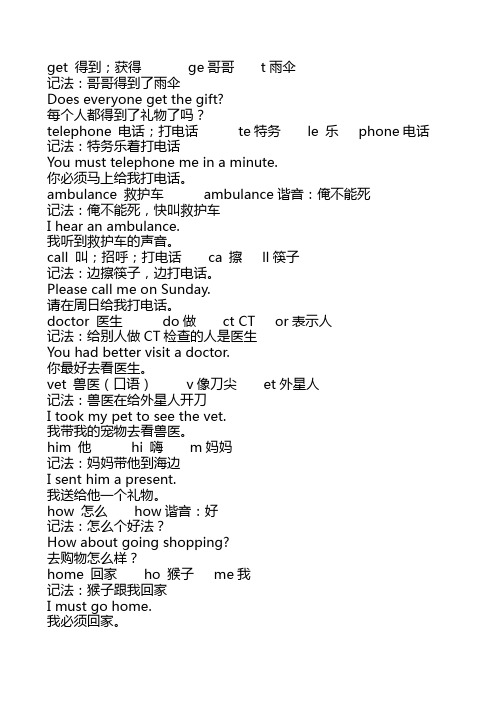
get 得到;获得ge哥哥t雨伞记法:哥哥得到了雨伞Does everyone get the gift?每个人都得到了礼物了吗?telephone 电话;打电话te特务le 乐phone电话记法:特务乐着打电话You must telephone me in a minute.你必须马上给我打电话。
ambulance 救护车ambulance谐音:俺不能死记法:俺不能死,快叫救护车I hear an ambulance.我听到救护车的声音。
call 叫;招呼;打电话ca 擦ll筷子记法:边擦筷子,边打电话。
Please call me on Sunday.请在周日给我打电话。
doctor 医生do做ct CT or表示人记法:给别人做CT检查的人是医生You had better visit a doctor.你最好去看医生。
vet 兽医(口语)v像刀尖et外星人记法:兽医在给外星人开刀I took my pet to see the vet.我带我的宠物去看兽医。
him 他hi 嗨m妈妈记法:妈妈带他到海边I sent him a present.我送给他一个礼物。
how 怎么how谐音:好记法:怎么个好法?How about going shopping?去购物怎么样?home 回家ho 猴子me我记法:猴子跟我回家I must go home.我必须回家。
farmer 农民;农场主farm 农场er人记法:农场里的人不是农民就是农场主The farmer grows tomatoes in the field.农民在土地里种西红柿。
nurse 护士nu努力r 花se蛇记法:护士努力从食人花里救出了蛇A nurse took her temperature.护士为她量体温。
pilot 领航员;飞行员pi 批lot许多记法:这一批有许多飞行员He works as a pilot.他是飞行员。
八年级上册英语第四单元单词速记

八年级上册--Unit 4theater ['θɪətə],['θi:ətər] n.(=theatre)戏院;剧场分析:th-土豪、eat-吃、er-儿记忆方法:在戏院看到土豪给吃的东西给儿子。
comfortable ['kʌmfə(r)təbl] adj.使人舒服的;舒适的分析:com-公司、for-谐音“佛”、table-桌记忆方法:公司有一尊佛舒适的躺在桌子上。
seat [siːt] n.座位;坐处(如椅子等)分析:sea-海洋、t-伞记忆方法:海洋上有伞的地方就有座位。
screen [skriːn] n.银幕;屏幕分析:sc-蔬菜、re-热、en-恩记忆方法:屏幕上出现有人把蔬菜热了给恩人吃。
close [kləʊs] adj.(在空间、时间上)接近分析:c-月亮、lo-象形数字“10”、se-色记忆方法:接近月亮能看到它有10种颜色。
ticket [ˈtɪkɪt] n.票;入场券分析:ti-体、ck-刺客、et-儿童记忆方法:体育彩票被刺客拿给儿童了。
worst [wɜː(r)st] ad j.&adv.(bad和badly的最高级)最差(的);最坏(的);最糟(的)分析:wo-我、r-小草、st-石头记忆方法:最坏的情况是我的小草被石头压扁了。
cheaply ['tʃiːpli] adv.便宜地;低廉地分析:che-车、ap-阿婆、ly-旅游记忆方法:车被便宜地卖给阿婆去旅游了。
song [sɒŋ],[sɔːŋ] n.歌;歌唱分析:song-送记忆方法:我唱首歌曲送给妈妈。
DJ [ˈdi: dʒeɪ] n.(电台、电视台、俱乐部的)音乐节目主持人分析:D-弟弟、J-鸡记忆方法:音乐节目主持人介绍弟弟养鸡。
choose [tʃuːz] v.(chose/tʃəʊz)选择;挑选分析:ch-吃货、oo-望远镜、se-色记忆方法:吃货买望远镜选择有颜色的。
精读6L4单词

boom低沉声
brunch晚早餐,早中饭
bump肿;瘤
butt撞
cab驾驶室
caddy球童
chilly寒冷的
civil engineer土木工程师
clamp压制
clubhouse俱乐部会所
clumsy笨拙的
cold compress冷敷
crabby抱怨的;暴躁的
prolific多产的
protagonist主角
provocation挑衅
pump抽水机
rampage狂暴行为
rash (皮)疹
reel眩晕
refrain克制
reproductive生育的
resolute果断的
resurrection复活
retrospection回顾
ritual仪式
river flat河积平原
agitated焦虑的
animate有生命的
antihistamine lotion抗组胺药膏
aster紫苑属植物
back out of退出
basin脸盆
beguile诱惑
belly button肚脐
Big Dipper大熊星座的北斗七星
bind约束
blotch (皮肤上的)疱,疙瘩,斑
blowup激烈的争论
veil面纱
veranda走廊
vulnerable易受伤的,脆弱的
wade涉水
water lily睡莲
water table地下水位
watercourse河床
welt鞭痕
wickedly邪恶的
wire电报
wriggle蠕动
zing发出尖啸声
PEP英语六年级下册第四单元单词巧记方法
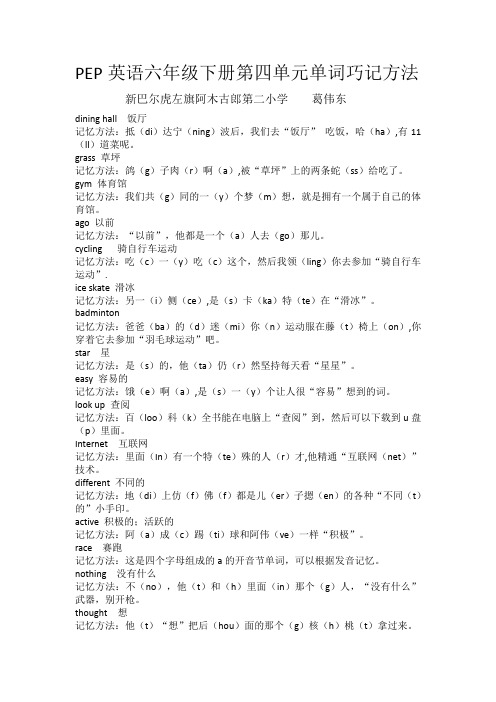
PEP英语六年级下册第四单元单词巧记方法新巴尔虎左旗阿木古郎第二小学葛伟东dining hall 饭厅记忆方法:抵(di)达宁(ning)波后,我们去“饭厅”吃饭,哈(ha),有11(ll)道菜呢。
grass 草坪记忆方法:鸽(g)子肉(r)啊(a),被“草坪”上的两条蛇(ss)给吃了。
gym 体育馆记忆方法:我们共(g)同的一(y)个梦(m)想,就是拥有一个属于自己的体育馆。
ago 以前记忆方法:“以前”,他都是一个(a)人去(go)那儿。
cycling 骑自行车运动记忆方法:吃(c)一(y)吃(c)这个,然后我领(ling)你去参加“骑自行车运动”.ice skate 滑冰记忆方法:另一(i)侧(ce),是(s)卡(ka)特(te)在“滑冰”。
badminton记忆方法:爸爸(ba)的(d)迷(mi)你(n)运动服在藤(t)椅上(on),你穿着它去参加“羽毛球运动”吧。
star 星记忆方法:是(s)的,他(ta)仍(r)然坚持每天看“星星”。
easy 容易的记忆方法:饿(e)啊(a),是(s)一(y)个让人很“容易”想到的词。
look up 查阅记忆方法:百(loo)科(k)全书能在电脑上“查阅”到,然后可以下载到u盘(p)里面。
Internet 互联网记忆方法:里面(In)有一个特(te)殊的人(r)才,他精通“互联网(net)”技术。
different 不同的记忆方法:地(di)上仿(f)佛(f)都是儿(er)子摁(en)的各种“不同(t)的”小手印。
active 积极的;活跃的记忆方法:阿(a)成(c)踢(ti)球和阿伟(ve)一样“积极”。
race 赛跑记忆方法:这是四个字母组成的a的开音节单词,可以根据发音记忆。
nothing 没有什么记忆方法:不(no),他(t)和(h)里面(in)那个(g)人,“没有什么”武器,别开枪。
thought 想记忆方法:他(t)“想”把后(hou)面的那个(g)核(h)桃(t)拿过来。
新概念第四册课文及生词Lesson4~6
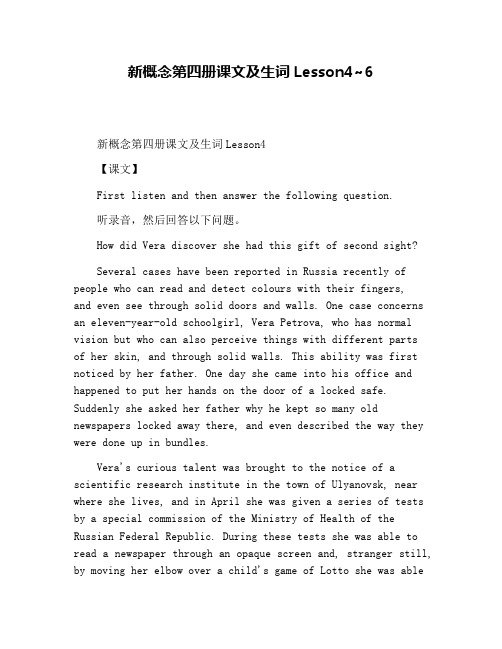
新概念第四册课文及生词Lesson4~6新概念第四册课文及生词Lesson4【课文】First listen and then answer the following question.听录音,然后回答以下问题。
How did Vera discover she had this gift of second sight?Several cases have been reported in Russia recently of people who can read and detect colours with their fingers,and even see through solid doors and walls. One case concerns an eleven-year-old schoolgirl, Vera Petrova, who has normal vision but who can also perceive things with different partsof her skin, and through solid walls. This ability was first noticed by her father. One day she came into his office and happened to put her hands on the door of a locked safe. Suddenly she asked her father why he kept so many old newspapers locked away there, and even described the way they were done up in bundles.Vera's curious talent was brought to the notice of a scientific research institute in the town of Ulyanovsk, near where she lives, and in April she was given a series of tests by a special commission of the Ministry of Health of the Russian Federal Republic. During these tests she was able to read a newspaper through an opaque screen and, stranger still, by moving her elbow over a child's game of Lotto she was ableto describe the figures and colours printed on it; and, in another instance, wearing stockings and slippers, to make out with her foot the outlines and colours of a picture hidden under a carpet. Other experiments showed that her knees and shoulders had a similar sensitivity. During all these tests Vera was blindfold; and, indeed, except when blindfold she lacked the ability to perceive things with her skin. It was also found that although she could perceive things with her fingers this ability ceased the moment her hands were wet.ERIC DE MAUNY Seeing hands from The Listener【New words and expressions 生词和短语】solid adj. 坚实的safe n. 保险柜ulyanovsk n. 乌里扬诺夫斯克commission n. 委员会opaque adj. 不透明的lotto n. 一种有编号的纸牌slipper n. 拖鞋blindfold adj.& adv. 被蒙上眼睛的新概念第四册课文及生词Lesson5【课文】First listen and then answer the following question.听录音,然后回答以下问题。
英语中的一些记忆法
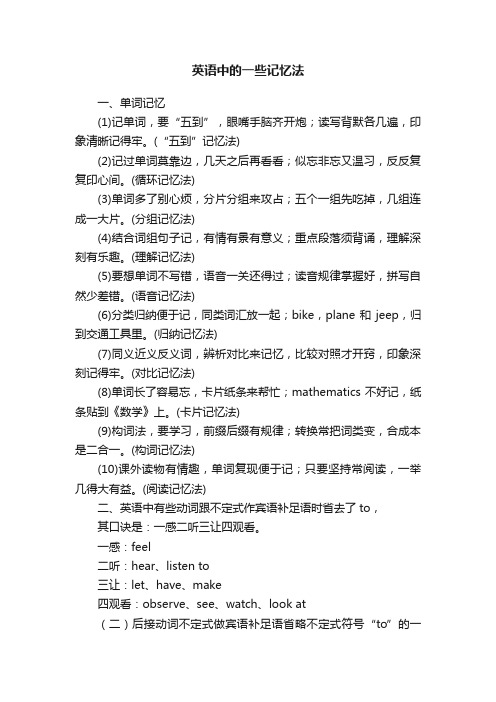
英语中的一些记忆法一、单词记忆(1)记单词,要“五到”,眼嘴手脑齐开炮;读写背默各几遍,印象清晰记得牢。
(“五到”记忆法)(2)记过单词莫靠边,几天之后再看看;似忘非忘又温习,反反复复印心间。
(循环记忆法)(3)单词多了别心烦,分片分组来攻占;五个一组先吃掉,几组连成一大片。
(分组记忆法)(4)结合词组句子记,有情有景有意义;重点段落须背诵,理解深刻有乐趣。
(理解记忆法)(5)要想单词不写错,语音一关还得过;读音规律掌握好,拼写自然少差错。
(语音记忆法)(6)分类归纳便于记,同类词汇放一起;bike,plane和jeep,归到交通工具里。
(归纳记忆法)(7)同义近义反义词,辨析对比来记忆,比较对照才开窍,印象深刻记得牢。
(对比记忆法)(8)单词长了容易忘,卡片纸条来帮忙;mathematics不好记,纸条贴到《数学》上。
(卡片记忆法)(9)构词法,要学习,前缀后缀有规律;转换常把词类变,合成本是二合一。
(构词记忆法)(10)课外读物有情趣,单词复现便于记;只要坚持常阅读,一举几得大有益。
(阅读记忆法)二、英语中有些动词跟不定式作宾语补足语时省去了to,其口诀是:一感二听三让四观看。
一感:feel二听:hear、listen to三让:let、have、make四观看:observe、see、watch、look at(二)后接动词不定式做宾语补足语省略不定式符号“to”的一些常用特殊动词一些动词要掌握,have, let和make,此三动词是使役,“注意”“观察”“听到”see,还有feel和watch,使用它们要仔细,后接“宾补”略去“to”,此点千万要牢记除此之外,还可以掌握“八字言”,一感feel,二听hear, listen to, 三让have, let, make,四看see, look at, observe, watch不带to的不定式作宾补不定式,不带to,九个动词要记住,一听(hear)二看(see, watch)三感觉(feel, notice, observe),make, let和have;作宾补,是秃头;当主补时要带to.三、关于“some time”分开“一段时间”, some time表示“一段时间”;相聚“在某一时”,sometime表示“在某一时”;“有时”相聚加s,sometimes表示“有时,不时”;“几次”分开带s,some times表示“几次,次数”。
英语词汇记忆法
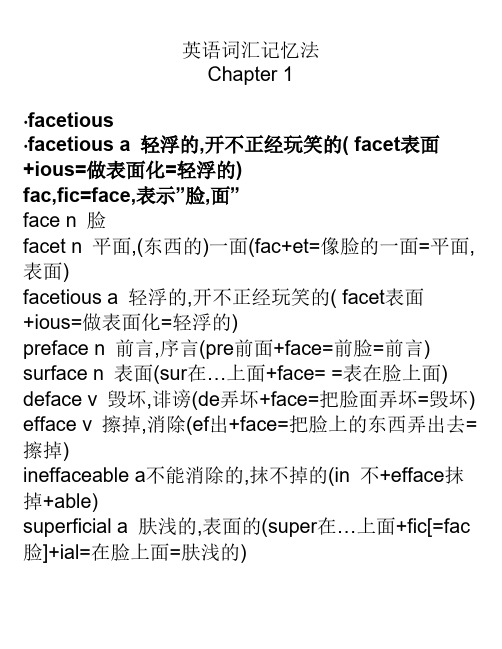
英语词汇记忆法Chapter 1•facetious•facetious a 轻浮的,开不正经玩笑的( facet表面+ious=做表面化=轻浮的)fac,fic=face,表示”脸,面”face n 脸facet n 平面,(东西的)一面(fac+et=像脸的一面=平面,表面)facetious a 轻浮的,开不正经玩笑的( facet表面+ious=做表面化=轻浮的)preface n 前言,序言(pre前面+face=前脸=前言) surface n 表面(sur在…上面+face= =表在脸上面) deface v 毁坏,诽谤(de弄坏+face=把脸面弄坏=毁坏) efface v 擦掉,消除(ef出+face=把脸上的东西弄出去=擦掉)ineffaceable a不能消除的,抹不掉的(in 不+efface抹掉+able)superficial a 肤浅的,表面的(super在…上面+fic[=fac 脸]+ial=在脸上面=肤浅的)•GRE词汇精选(红宝书)•ostentatious•adj 卖弄的,自我夸耀的=pretentious【记】os我死,ten10,tatious:我死了10次-吹牛的【根】osten表面,tatious:表面装饰的不错-卖弄的【参】ostensible(adj 理由等表面的)【反】ostentation(n 卖弄)-artlessness(n 天真烂漫)/ modesty(n 谦逊)“•【根】tend,tens,tent=to stretch(张开)•optimum n (生物成长)最适宜的条件或环境(optim+um表示场地,如:museum博物馆)optim=bext,表示”最好”optimsm n 乐观主义(optim+ism=向最好方面想的主义=乐观主义)optimistic a 乐观的(optim+ist+ic)【根】opt=to wish(希望)•best, optimal, superlative, unsurpassed.detriment n 损害,不利(de坏+tri[=trit]+ment=磨坏了=损害)trit=rub,表示”磨擦”attriton n 磨擦,消耗detriment n 损害,不利(de坏+tri[=trit]+ment=磨坏了=损害)trite a 陈腐的(像被磨破了一样)contrite a 悔恨的(con共同+trite=身心全部磨擦=悔恨交加的)单词词源词典•detriment•[15] Etymologically, detriment denotes damage caused by ‘wearing away’. The word comes via Old French from Latin dētrīmentum, a derivative of dēterere ‘wear away’ (whose past participle is the source of English detritus [18]). This was a compound verb formed from the prefix dē- ‘away’ and terere ‘rub’ (from which English gets attrition and trite). The generalized metaphorical sense‘harm’ had already developed in classical Latin. Link: ATTRITION, DETRITUS, TRITE•vicarious•adj 代理的,替代的(代替他人忍受或工作的)【记】vicar(n 代理主教:代替神父或主教的神职人员),ious:代理的vi微,car车,ious:微型的小汽车有代替大车的趋势-代替的【反】firsthand(adj 直接的;第一手的)"•单词词源词典•vicar•[13] A vicar is etymologically a ‘substitute’ for or‘representative’ of someone else: thus the pope is the vicar of God on Earth, and the vicar of a parish was originally someone who stood in for the parson or rector. The word comes via Old French vicaire from Latin vicārius ‘substitute, deputy’. This was a noun use of the adjective vicārius‘substituting’ (source of English vicarious [17], which more closely preserves the meaning of its Latin original). And vicārius in turn was derived from vicis ‘change, turn, office’, source also of English vicissitude [16] and the prefix vice-.•dexterous•dexterous a 灵巧的,敏捷的(右手比左手灵巧) dexter = right,表示”右边”dexterous a 灵巧的,敏捷的(右手比左手灵巧) dexterity n 敏捷(dexter+ity)ambidextrous a 非常灵活的(amdi两个+dextrous=两只手都和右手一样灵巧)dextral a 右边的,用右手的(dextr+al)反义词: awkward clumsy unskillful•scrupulous•adj. 小心谨慎的,正直的(having moral integrity; painstaking)【反】probity ◆ unscrupulousness 正直的◆不正直的【同】upright, conscientious , painstaking, punctilious【例】working with scrupulous care【记】[scruple]顾及+[lous]à很多顾及à小心谨慎的•单词词源词典•scruple•[16] Latin scrūpus meant ‘sharp stone’, and the notion of something troubling the mind like a painful stone in the shoe led to its metaphorical use for‘anxiety, doubt, particularly over a moral issue’. Both meanings were carried over into the diminutive form scrūpulus, which also came to be used for a very small unit of weight. This passed into English via French scrupule as scruple, on the way losing the literal sense ‘small stone’.gregarious a 群居的, 爱社交的(greg+arious爱…的=爱群体的)greg=group,表示”群体”gregarious a 群居的, 爱社交的(greg+arious爱…的=爱群体的)aggregate v 合计,聚集(ag增加+greg+ate=增加团体=聚集)aggregation n 聚集物(aggregate+ion)congregate v 聚集(con共同+greg+ate=共同集会) disaggregate v 分解,分离(dis分+aggregate聚合=聚合的东西分开=分解)egregious a 过分的,不寻常的(e出+greg+iuos=出了一般团体=过分的)segregate v 分开,隔离(se分开+greg+ate=和群体分开)segregation n (种族)隔离(segregate+ion) discretion谨慎,小心cern, cert, cret=sure, separate,表示”搞清,区别”concern 关系到discern辨别,区分(dis分开+cern=分开搞清=区别) discernmible能够分辨的discernment辨别能力centain肯定的(cert+ain=搞清楚的=肯定的) ascertain确定,发现certify证明,保证certificate证明书,执照(certify+icate=证明的东西) certitude确信,确实discrete分立的(dis分开+creet区别=分开区别=不同的)discretion谨慎,小心discreet慎重的,谨慎的secret秘密的(se分开+cret区别=分开来放=秘密的) 同义词:circumspection delicacy discernment discreetness free will prudence【类】apathetic: emotion=imprudent: discretion冷漠的缺乏感情=轻率的缺乏谨慎frivolous: gravity=brash: discretion轻率的缺乏庄重=草率的缺乏谨慎foolish:discretion=impecunious: money 愚蠢的没有判断力=贫穷的没有钱overdose:prescription=indiscretion: convention过量用药违背药方=轻率之举违背规矩习俗•sensory•sensory a 感觉的,知觉的(sens+ory)sens, sent =feel, 表示”感觉”sense n 感觉sensible a 能感觉的,明智的(sens+ible) sensibility n 敏感性,感情(sensible+ity)sensitive a 敏感的(sens+itive)sensory a 感觉的,知觉的(sens+ory)sentiment n 感情(senti+ment=感觉=感情) sentimental a 多感情的,感伤的(sentiment+al) nonsense n 无意义的话(non无+sense感觉,意义=无意义)assent n 赞成,附和(as一样+sent=感觉一样=赞成) consent v 同意,答应(con共同+sent=共同感觉=同意) consentient a 同意的,一致的dissent v 持不同意见(dis分开+sent=感觉不合=意见不同)dissension n 意见不合,冲突(dis+sens+ion) consensus n 一致意见(con共同+sens+us=感觉一致) presentiment n 预感(pre预先+sentiment感觉) resent v 怨恨(re反+sent=反感=怨恨)resentment n 愤怒,怨恨(resent+ment)Chapter 2instigate v 教唆,煽动(in进入+stig[=stinct]+ate=刺激[别人]内部=煽动)sting ,stinct,stimul=priek表示”刺,刺激”sting v 刺n.刺针stingy a 小气的(sting+y=像刺一样[小的心胸]=小气的distinguish a 区别,辩出(dis分开+stingu[=sting]+ish=把刺分开=区别)distinguished a 著名的,卓越的(区别=与众不同=著名的)extinguish v 熄灭(ex+stingu+ish=把刺拿出去=刺引申为火焰=灭火)distinct a 清楚的,明显的(dis分开+stinct=把刺分开=与众不同的=明显的)distinctive a 有区别的(distinct+ive)distinction n 区别,优秀(distinct+ion)extinct a 灭绝的(ex+stinct,来自extinguish,熄灭=灭绝的)extinction n 灭绝instinct a 本能,本性(in内+stinct=内在的刺激=本能) stimulate v 刺激,鼓励(stimul+ate=刺激) stimulation n 刺激,鼓励instigate v 教唆,煽动(in进入+stig[=stinct]+ate=刺激[别人]内部=煽动)•rudimentary•adj.根本的, 未发展的•【根】rud=raw(天然的;粗糙的)•【同】elementary, beginning, elemental, rudimental, primitive•resilient a 有弹性的(re重新+sil[+sal]+ient=能重新跳起来=有弹性的)sal=leap,表示”跳”salient a 显著的,突出的(sal+lent=跳出来的=显著的) assail v 攻击,进攻(as一再+sail[=sal]=一再跳起来=攻击)resilient a 有弹性的(re重新+sil[+sal]+ient=能重新跳起来=有弹性的)【根】sail, sil,sal,sult=to leap(跳)•collaborate•collaborate v合作,勾结(col共同+labor+ate=共同劳动=合作)labor=labor,表示”劳动”labored a 吃力的,费力的(labor+ed=被劳动出来的=费力的)laborious a 辛苦的,吃力的(labor+ious=劳动的=辛苦的)laboratory n 实验室(labor+atory地方=劳动之地=实验室)belabor v 过分罗嗦,重击(be+_labor=过分劳作=过分做事或罗唆)elaborate v 精工细做(e出+labor+ate=做出来的=精工细做)collaborate v合作,勾结(col共同+labor+ate=共同劳动=合作)zealot n 热心者(zeal热情)-ot表名词,”…人”bigot n 顽固而心胸狭窄的人(中世纪英语bigod=by god的变体)idiot n 白痴(idio愚蠢)zealot n 热心者(zeal热情)polyglot n 通晓多种语言的人(poly多+glot舌头,语言)patriot n 爱国者(patri父亲)pilot n “飞行员,领航员(意大利语piloto”划浆”的变体)”compatriot n 同胞(com共同+patri父亲)•zealot n 热心者,狂热者(zeal+ot表示人,如,hekot奴隶)zeal=ardor,表示”热心”zeal n 热心,一心一意zealot n 热心者,狂热者(zeal+ot表示人,如,hekot奴隶)zealous a 热心的(zeal+ous)jealous a 妒忌的(jeal[=zeal]+ous=对…热心而得不到,所以妒忌)•squelch•v 压=squash;(通过有力的反驳)使无言以对;镇压=quell=quench【记】squ压,elch:镇压【反】foment(v 煽动);kindle(vt 点燃;煽动)"•venerate•v 崇敬,敬仰【类】venerable:reverence=despicable:scorn可敬的人被尊敬=可鄙的人被鄙视【反】dishonor(n /v 使蒙羞);despise(v 轻视);scorn(v /n 轻蔑)“•【同】revere, adore, reverence, worship •despondent a 失望的(despond丧气+ent )spond, spons =promise,表示”承诺”despond v 丧气(de去掉+spond=不再承诺=使人丧气)despondent a 失望的(despond丧气+ent )respond v 回答,反应(re回+spond=承诺回去=回答) respondent n 被告a. 被告的(回答原告的人) response n 回答,答应(respond的名词)responsible a 有责任的(response回应+ible=能回应的=负责任的)correspond v 符合,通信(cor共同+respond回答=两人互相回答=通信)correspondence n 通信,来往spontaneous a 自愿的,自发的(spont+aneous=自[内心]承诺=自愿的)同义词: •dejected depressed discouraged downcast downhearted •retrospect 回顾,回想(retro+spect 看=向后看)retro-表示”向后,倒退”retrograd 后退,倒退(retro+grade 走=向后走)retrogress 倒退,退化(retro+gress 走=向后走)retrospect 回顾,回想(retro+spect 看=向后看)retroaction 倒行,反动(retro+action 行动=向后行动=倒行逆施)retroject 向后投射(retro+ject 扔=向后扔)retrovert 把….翻转,使倒退(retro+vert 转=向后转=侄退)•retrospect v 回顾,回想(retro 向后+spect 看=向后看=回顾)定,spect, spic= look, see,表示”看”aspect n 样子,容貌,方面(a加强意义+spect=看的东西=外表,容貌)circumspect a 慎重的(circum周围+spect=看周围=小心的)circumspection n 慎重,细心expect v 期待,盼望(ex出+spect=看出去=期待) expectation n 期待,希望(expect+ation)inspect v 检查,视察(in内+spect=看进去=视察) inspection n 视察,认真看(inspect+ion) perspective n 看法,眼界,透视(per全部+spect+ive=全部看到=透视,看法)prospect n 展望,前景(pro向前+spect=向前看=展望) prospective a 将来的(prospect前景+ive) prospectus n 计划书,大纲(pro+spect+us=向前看的东西=大纲)respect v/n 尊敬(re再+spect=再看[一眼]=尊敬) respectable a 可敬的(respect+able)respectful a 充满敬意的(respect+ful)respective a 各自的(re回+spect+ive=回头看[自己] =各自的)retrospect v 回顾,回想(retro向后+spect看=向后看=回顾)retrospective a 回顾的,怀旧的suspect v 怀疑(sus下面+spect=在下面看=怀疑) suspicion n 怀疑(sus+spic+ion=在下面看=怀疑) suspicious a 多疑的(sus+spic+ious)spectacle n 奇观,状观,(spect+acle复)眼镜(spect+acle=看的东西=眼镜)spectacular a 奇妙的,惊人的(spect+acular…的,来自spectacle奇观)spectator n 观众,旁观者(spect+ator人=看的人=观众)speculate v 思索,投机(spec+ulate=看准了=思考,投机)speculation n 思索,投机(spec+ulate=看准了=思考,投机)auspice n 吉兆,前兆(au鸟+spice=看到鸟[喜鹊]=吉兆)auspicious a 吉兆的(auspice+ious)conspicuous a 显眼的,引人注目的(con大家+spic+uous=大家都看见=显眼的)despicable a 可鄙的(de向下+spic+able=向下看=看不起=可鄙视的)despise v 轻视,看不起(spis=spic)perspicacious a 有洞察力的(per全部+spic+acious…的=全部都看到的)•scoff•n. 笑柄,嘲笑v. 嘲笑(to treat or address with derision: mock)v.狼吞虎咽【类】scoff:derisive=bluster:loud=pontificate:pompous嘲笑:嘲笑的=怒号:大声的=武断:高傲的(动作典型特征)scoff:contempt=thank:gratitude 嘲笑:轻蔑=感谢:感谢(同义)【同】scoff, jeer, gibe, fleer, sneer, flout【例】scoffed at their concernsChapter 3•juxtapose v 并列,并置(juxta并排+pose=并排放) pos, posit=put, 表示”放”pose v 做姿态compose v 组成,作曲,使镇定(com一起+pose=放到一起=组成)composure n 镇静,沉着(com一起+pos+ure=[精神]放到一起=镇静)depose v 免职,沉淀(de去掉+pose放,职位=去掉职位=免职,de下去+pose=放下去=沉淀)discompose v 使不安(dis不+compose不镇静=使不安)dispose v 处理,排列(dis分开=pose=分开[排好]=排列)disposed a 愿意的(听任处理=心甘情愿的) indisposed a 不愿意的(in不+disposed情愿的) expose v 暴露,揭露(ex出+pose=放出来=暴露) impose v 强加,征税(im进+pose=放进去=强加) juxtapose v 并列,并置(juxta并排+pose=并排放) opposite a 相对的(op对+pos+ite=放到对面=相对的) repose n 休息,睡眠(re再+pose=再放下[工作]=休息) transpose v 互换位置(trans转移+pose=[互相]移放) proposal n 建议,提议(pro 向前+pos+al=向前放=提建议)purpose n 目的,意图(pur始终+pose=始终放的东西=目的)•position n 立场(posit+ion=放出的[立场],posit本身是一个单词,意为”认为,肯定” )positive a 肯定的,积极的(posit肯定+ive)apposite a 适当的,得体的(ap加强动作+posite=放到(合适的位置)=适当的)apposition n 并置,同位(ap+posit+ion=放在[一起]=并置)composition n 作文,组合(com一起+posit+ion=放到一起=组合=作文)composite n 合成物(com一起+posite=放到一起=合成物)deposit v 储存n. 矿藏(de下面+posit=放下不用=储存)depositary n 贮藏所(deposit+ary)deposition n 免职,沉淀(见depose)disposition n 性情,安排(dis分开+posit+ion=分开放=安排,引申为人的喜好,心情)exposition n 展览,解释(见expose)repository n 仓库(re重新+posit+ory=重新放东西之地=仓库)suppose n 推测,猜想(sup在下面+pose=放在下面的[想法]=推测)•lethargy 昏睡(leth原意是” 忘川”,喝了忘川水,一切都忘记)leth=oblivion (遗忘)lethal 致命的(忘了,死了)单词词源词典•Greek léthē meant ‘oblivion’ (the Romans used it for the name of a river in Hades whose water induced forgetfulness, and its influence has also been traced in changing Latin lētum ‘death’ tolēthum, source of English lethal [17]). From it was formed the adjective léthargos, which in turn produced the noun lēthargíā, source (via Latin and Old French) of English lethargy.•ambiguous adj.暧昧的, 不明确的【根】ambi-=on both sides,about,arround 变化型amb-•ambidextrous非常灵活的(amdi两个+dextrous→两只手都和右手一样灵巧)[dexter=right,表示"右边"]•ambivalent adj.矛盾的, 好恶相克的•单词词源词典•Ambiguous carries the etymological notion of‘wandering around uncertainly’. It comes ultimately from the Latin compound verb ambigere, which was formed from the prefix ambi- (as inAMBIDEXTROUS) and the verb agere ‘drive, lead’ (a prodigious source of English words, including act and agent). From the verb was derived the adjective ambiguus, which was borrowed directly into English. The first to use it seems to have been Sir Thomas More: ‘if it were now doubtful and ambiguous whether the church of Christ were in the right rule of doctrine or not’ A dialogue concerning heresies 1528.•inane•adj. 空洞的(lacking significance, meaning, or point)【反】expressive 有表现力的meaningful有意义的pregnant富有意义的significant有意义的weighty有内容的substantiated实体化的【记】in+an+e 在一个e时代里,人们普遍感到空虚【同】blank, empty, empty-headed, vacant, vacuous.•dissident a 持不同意见的(dis+sid+ent)持不同意见的人•sid, sed=sit,表示”坐”consider v 考虑(con共同+sider坐=坐在一起思考=考虑)considerate a 考虑周到的(consider+ate)reside v 居住(re再+side=再坐[之地]=居住) residence n 居住,住宅(reside+ence)preside v 主持(pre前面+side=在前面坐=主持) president n 总统,校长(pre+sid+ent人=有前面坐的人=总统)presidium n 主席团(preside+ium表示地方或团体=前面坐的团体)dissidence n 意见不同(dis分开+sid+ence=分开坐=意见不同)subside v 沉淀,平息(sub下+side=坐下去=沉淀) subsidiary a 补助的(sub下+sid+iary=坐在下面[帮助别人]=补助的)subsidy n 补助金(sub+sid+y)insidious a 阴险的(in内+sid+ious=坐在内部的[坏人]=阴险的)residue n 残余,余渣(re回+sidue=[不能用]重新坐回来=残余)assiduous a 勤勉的,刻苦的(as一再+sid+uous=一再坐着[学习]=勤勉的)sedate a 文静的(sed[=sid]+ate=坐着的=文静的) sedulous a 勤勉的(sed+ulous多…的=坐得多的=勤勉的)supersede v 代替,取代(super在上面+sede=坐到上面去=取代)sedentary a 坐着的,久坐的(sed+ent+ary=坐着的)•embellish v 装饰(em进入+bell美丽+ish)em-,en-①表示”进入…之中,包围”embrace拥抱(em+brace胳膊=进入怀抱)embed安置,嵌于(em+bed范围,床=进入范围=安置) empathy感情相融的(em+pathy感情=进入感情) embarrass使难堪(em+barrass套子=进入套子=难堪) embattle整军备战(em+battle战斗)enroll注册,记入名册(en+roll名单)encage关入笼中(en+cage笼子)enchain束缚(en+chain锁链)②表示”使…进入状态”empower授权(em+power权力)embitter使痛苦(em+bitter痛苦的)embody体现(em+body身体=(精神)进入身体=体现)embellish装饰(em+bell美好+ish=进入美好=装饰) emboss使凸出(em+boss凸出=使凸出)enact制定,颁布(en+act行动=进入行动=颁布(法令)) enchant使迷醉(en+chant咒语=被咒语所迷醉) encompass包围,围绕(en+compass包围) endanger使危险(en+danger危险)encourage鼓励(en+courage勇气=使人进入勇气=鼓励)enlighten启发,开导(en+ligh光+en=给人光明=启发)•bell=fine (美好)embellish v 装饰(em使+bell+使—美好)belle n 美女•subsidize ['sʌbsidaiz]•v.资助, 津贴•【根】sed,sess,sid=to sit(坐)•同:back, capitalize, finance, fund, grubstake •fritter•v (在无意义上的小事上)愚蠢地逐渐地浪费(时间和金钱)【记】fr=free,itter=litter(n 垃圾vt 乱丢垃圾):free litter-象乱扔垃圾一样浪费时间和金钱。
chapter 4知识点总结

Chapter 4V ocabulary1. 1 behave-behaviour--- behavioural ( adj.) --- behaviourally (adv.)behaviourism ―行为主义‖—behaviourist ―行为主义者‖2 hurt v. hurt hurt (injure 同义词)3 bully v. --- bullying n.欺凌弱小者;土霸4 violent adj.-violently adv. – violence n.5 help-helpful adj. – unhelpful adj. – helpless adj.6 education- educational (adj.)—educatoreducator ―教师,教育工作者‖ education alist ―教育家―7 medical- medicine n.8 advise v. – advice n.adviser ―顾问‖suggest—suggestion9 conclusion n. – conclude v. concluding (adj.) ―结束的‖10 formal-informal (非正式的) --formally11 communicate v. – communication n.12 accident n.- accidentally adv.13 complain v. – complaint n.14.error – mistake(同义词) mistaken err v.15. counsel v.— counselor16. far—farther / further –farthest / furthest17.persude--persuas ion n. 说服力18.courage (n.) ―勇气‖ courage ous (adj.)―勇敢的;无畏的‖courageously (adv.) ―勇敢地;无畏地‖courageousness (n.)―勇敢;无畏‖dis courage vt.―使气馁; 使沮丧19expect—expected ---unexpected (adj.) ―没有料想到的‖unexpectedly (adv.)20. suffer ( vi.)―受痛苦‖;(vt)―.忍受,‖suffering (n.)―身体或心灵的痛苦, 苦难‖21. guilt( n.)―有罪‖-- guilty ( adj.) ―有罪的‖guiltless (adj.) ―无罪的,‖(= innocent)Phrases1. bad behaviour 不好的行为2. a checkout assistant 收银员3. by accident 意外地,偶然地4. at play 在玩耍5. leave for 前往…6. too… to太…以至于不能…7. feel guilty 有负罪感8. take the underground 坐地铁9. violent behaviour 暴力行为10. pay for 付款11. by mistake 错误地12. in the future 将来13. not… at all一点也不14. be afraid of 害怕…15. search for 寻找16. make an appointment 约会17. be responsible for 为…负责18. share with 与…分享19. belong to 属于20. be busy doing sth 忙于做某事21. persuade sb to do sth / persuade sb. into doing sth. 说服某人做某事22. advise sb. to do sth. 劝说某人做…… / advise doing sth.23. wait one’s turn 等轮到某人24. apologize to sb. for sth. 为某事向某人道歉/ make an apolpgy to ….25. respond to 响应……26 . none of one’s business 不关某人的事27. if necessary 如有必要的话28. be in trouble 处于困境中29. be careful with 认真,仔细30. in the case of 在…….的情况下31. in this situation 在这种情况下32. be questioned 被审问、询问Paraphrases1.The tree is too tall for the cat to climb.It is such a tall tree that the cat can’t clim b it.2.What’s your weight?How much do you weigh?3.Read more, and you will improve your English.If you read more, you will do better in your English.4.I spent two hours writing the article yesterday.It took me two hours to write the article yesterday.5.It is so hot today.It is such a hot day today.How hot today is!What a hot day (it is today)!6. I don't know what I should do next.I don’t know what to do next.7. What about going to the cinema tonight?How about going to the cinema tonight?Why not go to the cinema tonight?What do you think of going to the cinema tonight?8.Because she was rude,I made the decision to keep the money.She was rude, so I decided to keep the money.I decided to keep the money because of her rudeness.9.The young boy is traveling alone .The young boy is travelling on his own.The young boy is traveling by himself.10.She was so busy complaining that she gave me an extra 20-yuan note in my change.She was busy complaining so that she gave me an extra 20-yuan note in my change. 11.You all seem to be good friends.It seems (that) you are all good friends.12.I found the key accidentally when I was cleaning the room.I found the key by accident / by chance when cleaning the room.13.I managed to save him.I succeeded in saving him. / I saved him successfully.14.I took the underground home yesterday evening.I went home by underground yesterday evening.15. It is a piece of cake for Tom to finish the work on timeIt is very easy for Tom to finish the work on time.16. Beijing is located in the north of China.Beijing lies in the north of China./ Beijing is in the north of China.。
词汇用法book 4 M4-6
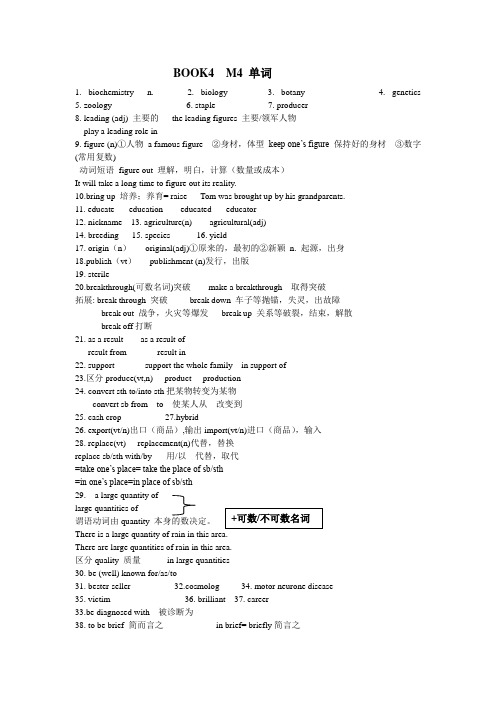
BOOK4 M4 单词1. biochemistry n.2. biology3. botany4. genetics5. zoology6. staple7. producer8. leading (adj) 主要的 the leading figures 主要/领军人物play a leading role in9. figure (n)①人物 a famous figure ②身材,体型 keep one’s figure 保持好的身材 ③数字(常用复数)动词短语 figure out 理解,明白,计算(数量或成本)It will take a long time to figure out its reality.10.bring up 培养;养育= raise Tom was brought up by his grandparents.11. educate-----education------educated-----educator12. nickname 13. agriculture(n)------agricultural(adj)14. breeding 15. species 16. yield17. origin (n )-----original(adj)①原来的,最初的②新颖 n. 起源,出身18.publish (vt )---- publishment (n)发行,出版19. sterile20.breakthrough(可数名词)突破 make a breakthrough 取得突破拓展: break through 突破 break down 车子等抛锚,失灵,出故障break out 战争,火灾等爆发 break up 关系等破裂,结束,解散break off 打断21. as a result as a result ofresult from result in22. support support the whole family in support of23.区分produce(vt,n)----product----production24. convert sth to/into sth 把某物转变为某物convert sb from···to···使某人从···改变到···25. cash crop 27.hybrid26. export(vt/n)出口(商品),输出import(vt/n)进口(商品),输入28. replace(vt)----replacement(n)代替,替换replace sb/sth with/by·····用/以···代替,取代···=take one’s place= take the place of sb/sth=in one’s place=in place of sb/sth29. a large quantity oflarge quantities of 谓语动词由quantity 本身的数决定。
英语词汇记忆法
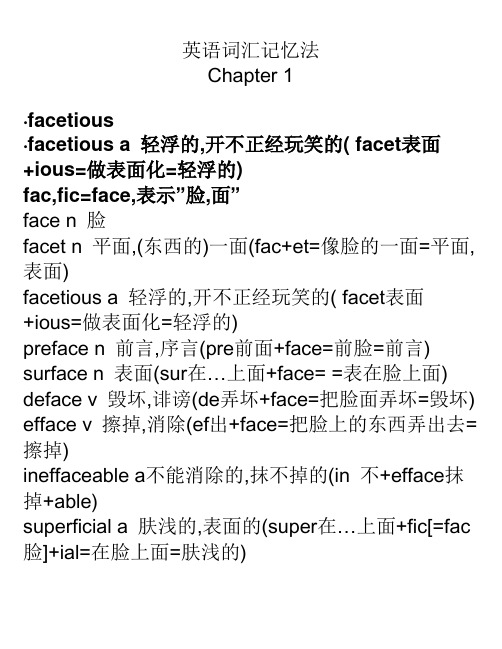
英语词汇记忆法Chapter 1•facetious•facetious a 轻浮的,开不正经玩笑的( facet表面+ious=做表面化=轻浮的)fac,fic=face,表示”脸,面”face n 脸facet n 平面,(东西的)一面(fac+et=像脸的一面=平面,表面)facetious a 轻浮的,开不正经玩笑的( facet表面+ious=做表面化=轻浮的)preface n 前言,序言(pre前面+face=前脸=前言) surface n 表面(sur在…上面+face= =表在脸上面) deface v 毁坏,诽谤(de弄坏+face=把脸面弄坏=毁坏) efface v 擦掉,消除(ef出+face=把脸上的东西弄出去=擦掉)ineffaceable a不能消除的,抹不掉的(in 不+efface抹掉+able)superficial a 肤浅的,表面的(super在…上面+fic[=fac 脸]+ial=在脸上面=肤浅的)•GRE词汇精选(红宝书)•ostentatious•adj 卖弄的,自我夸耀的=pretentious【记】os我死,ten10,tatious:我死了10次-吹牛的【根】osten表面,tatious:表面装饰的不错-卖弄的【参】ostensible(adj 理由等表面的)【反】ostentation(n 卖弄)-artlessness(n 天真烂漫)/ modesty(n 谦逊)“•【根】tend,tens,tent=to stretch(张开)•optimum n (生物成长)最适宜的条件或环境(optim+um表示场地,如:museum博物馆)optim=bext,表示”最好”optimsm n 乐观主义(optim+ism=向最好方面想的主义=乐观主义)optimistic a 乐观的(optim+ist+ic)【根】opt=to wish(希望)•best, optimal, superlative, unsurpassed.detriment n 损害,不利(de坏+tri[=trit]+ment=磨坏了=损害)trit=rub,表示”磨擦”attriton n 磨擦,消耗detriment n 损害,不利(de坏+tri[=trit]+ment=磨坏了=损害)trite a 陈腐的(像被磨破了一样)contrite a 悔恨的(con共同+trite=身心全部磨擦=悔恨交加的)单词词源词典•detriment•[15] Etymologically, detriment denotes damage caused by …wearing away‟. The word comes via Old French from Latin dētrīmentum, a derivative of dēterere …wear away‟ (whose past participle is the source of English detritus [18]). This was a compound verb formed from the prefix dē- …away‟ and terere …rub‟ (from which English gets attrition and trite). The generalized metaphorical sense …harm‟ had already developed in cl assical Latin. Link: ATTRITION, DETRITUS, TRITE•vicarious•adj 代理的,替代的(代替他人忍受或工作的)【记】vicar(n 代理主教:代替神父或主教的神职人员),ious:代理的vi微,car车,ious:微型的小汽车有代替大车的趋势-代替的【反】firsthand(adj 直接的;第一手的)"•单词词源词典•vicar•[13] A vicar is etymologically a …substitute‟ for or …representative‟ of someone else: thus the pope is the vicar of God on Earth, and the vicar of a parish was originally someone who stood in for the parson or rector. The word comes via Old French vicaire from Latin vicārius …substitute, deputy‟. This was a noun use of the adjective vicārius …substituting‟ (source of English vicarious [17], which more closely preserves the meaning of its Latin original). And vicārius in turn was derived from vicis …change, turn, office‟, source also of English vicissitude [16] and the prefix vice-.•dexterous•dexterous a 灵巧的,敏捷的(右手比左手灵巧) dexter = right,表示”右边”dexterous a 灵巧的,敏捷的(右手比左手灵巧) dexterity n 敏捷(dexter+ity)ambidextrous a 非常灵活的(amdi两个+dextrous=两只手都和右手一样灵巧)dextral a 右边的,用右手的(dextr+al)反义词: awkward clumsy unskillful•scrupulous•adj. 小心谨慎的,正直的(having moral integrity; painstaking)【反】probity ◆unscrupulousness 正直的◆不正直的【同】upright, conscientious , painstaking, punctilious【例】working with scrupulous care【记】[scruple]顾及+[lous]à很多顾及à小心谨慎的•单词词源词典•scruple•[16] Latin scrūpus meant …sharp stone‟, and the notion of something troubling the mind like a painful stone in the shoe led to its metaphorical use for …anxiety, doubt, particularly over a moral issue‟. Both meanings were carried over into the diminutive form scrūpulus, which also came to be used for a very small unit of weight. This passed into English via French scrupule as scruple, on the way losing the literal sense …small stone‟.gregarious a 群居的, 爱社交的(greg+arious爱…的=爱群体的)greg=group,表示”群体”gregarious a 群居的, 爱社交的(greg+arious爱…的=爱群体的)aggregate v 合计,聚集(ag增加+greg+ate=增加团体=聚集)aggregation n 聚集物(aggregate+ion) congregate v 聚集(con共同+greg+ate=共同集会) disaggregate v 分解,分离(dis分+aggregate聚合=聚合的东西分开=分解)egregious a 过分的,不寻常的(e出+greg+iuos=出了一般团体=过分的)segregate v 分开,隔离(se分开+greg+ate=和群体分开)segregation n (种族)隔离(segregate+ion) discretion谨慎,小心cern, cert, cret=sure, separate,表示”搞清,区别”concern 关系到discern辨别,区分(dis分开+cern=分开搞清=区别) discernmible能够分辨的discernment辨别能力centain肯定的(cert+ain=搞清楚的=肯定的) ascertain确定,发现certify证明,保证certificate证明书,执照(certify+icate=证明的东西) certitude确信,确实discrete分立的(dis分开+creet区别=分开区别=不同的)discretion谨慎,小心discreet慎重的,谨慎的secret秘密的(se分开+cret区别=分开来放=秘密的) 同义词:circumspection delicacy discernment discreetness free will prudence【类】apathetic: emotion=imprudent: discretion 冷漠的缺乏感情=轻率的缺乏谨慎frivolous: gravity=brash: discretion轻率的缺乏庄重=草率的缺乏谨慎foolish: discretion=impecunious: money 愚蠢的没有判断力=贫穷的没有钱overdose: prescription=indiscretion: convention过量用药违背药方=轻率之举违背规矩习俗•sensory•sensory a 感觉的,知觉的(sens+ory)sens, sent =feel, 表示”感觉”sense n 感觉sensible a 能感觉的,明智的(sens+ible)sensibility n 敏感性,感情(sensible+ity)sensitive a 敏感的(sens+itive)sensory a 感觉的,知觉的(sens+ory)sentiment n 感情(senti+ment=感觉=感情)sentimental a 多感情的,感伤的(sentiment+al) nonsense n 无意义的话(non无+sense感觉,意义=无意义)assent n 赞成,附和(as一样+sent=感觉一样=赞成) consent v 同意,答应(con共同+sent=共同感觉=同意) consentient a 同意的,一致的dissent v 持不同意见(dis分开+sent=感觉不合=意见不同)dissension n 意见不合,冲突(dis+sens+ion) consensus n 一致意见(con共同+sens+us=感觉一致) presentiment n 预感(pre预先+sentiment感觉) resent v 怨恨(re反+sent=反感=怨恨)resentment n 愤怒,怨恨(resent+ment)Chapter 2instigate v 教唆,煽动(in进入+stig[=stinct]+ate=刺激[别人]内部=煽动)sting ,stinct,stimul=priek表示”刺,刺激”sting v 刺n.刺针stingy a 小气的(sting+y=像刺一样[小的心胸]=小气的distinguish a 区别,辩出(dis分开+stingu[=sting]+ish=把刺分开=区别) distinguished a 著名的,卓越的(区别=与众不同=著名的)extinguish v 熄灭(ex+stingu+ish=把刺拿出去=刺引申为火焰=灭火)distinct a 清楚的,明显的(dis分开+stinct=把刺分开=与众不同的=明显的)distinctive a 有区别的(distinct+ive)distinction n 区别,优秀(distinct+ion)extinct a 灭绝的(ex+stinct,来自extinguish,熄灭=灭绝的)extinction n 灭绝instinct a 本能,本性(in内+stinct=内在的刺激=本能) stimulate v 刺激,鼓励(stimul+ate=刺激) stimulation n 刺激,鼓励instigate v 教唆,煽动(in进入+stig[=stinct]+ate=刺激[别人]内部=煽动)•rudimentary•adj.根本的, 未发展的•【根】rud=raw(天然的;粗糙的)•【同】elementary, beginning, elemental, rudimental, primitive•resilient a 有弹性的(re重新+sil[+sal]+ient=能重新跳起来=有弹性的)sal=leap,表示”跳”salient a 显著的,突出的(sal+lent=跳出来的=显著的) assail v 攻击,进攻(as一再+sail[=sal]=一再跳起来=攻击)resilient a 有弹性的(re重新+sil[+sal]+ient=能重新跳起来=有弹性的)【根】sail, sil,sal,sult=to leap(跳)•collaborate•collaborate v合作,勾结(col共同+labor+ate=共同劳动=合作)labor=labor,表示”劳动”labored a 吃力的,费力的(labor+ed=被劳动出来的=费力的)laborious a 辛苦的,吃力的(labor+ious=劳动的=辛苦的)laboratory n 实验室(labor+atory地方=劳动之地=实验室)belabor v 过分罗嗦,重击(be+_labor=过分劳作=过分做事或罗唆)elaborate v 精工细做(e出+labor+ate=做出来的=精工细做)collaborate v合作,勾结(col共同+labor+ate=共同劳动=合作)zealot n 热心者(zeal热情)-ot表名词,”…人”bigot n 顽固而心胸狭窄的人(中世纪英语bigod=by god的变体)idiot n 白痴(idio愚蠢)zealot n 热心者(zeal热情)polyglot n 通晓多种语言的人(poly多+glot舌头,语言) patriot n 爱国者(patri父亲)pilot n “飞行员,领航员(意大利语piloto”划浆”的变体)”compatriot n 同胞(com共同+patri父亲)•zealot n 热心者,狂热者(zeal+ot表示人,如,hekot奴隶)zeal=ardor,表示”热心”zeal n 热心,一心一意zealot n 热心者,狂热者(zeal+ot表示人,如,hekot奴隶)zealous a 热心的(zeal+ous)jealous a 妒忌的(jeal[=zeal]+ous=对…热心而得不到,所以妒忌)•squelch•v 压=squash;(通过有力的反驳)使无言以对;镇压=quell=quench【记】squ压,elch:镇压【反】foment(v 煽动);kindle(vt 点燃;煽动)"•venerate•v 崇敬,敬仰【类】venerable:reverence=despicable:scorn可敬的人被尊敬=可鄙的人被鄙视【反】dishonor(n /v 使蒙羞);despise(v 轻视);scorn(v /n 轻蔑)“•【同】revere, adore, reverence, worship •despondent a 失望的(despond丧气+ent ) spond, spons =promise,表示”承诺”despond v 丧气(de去掉+spond=不再承诺=使人丧气)despondent a 失望的(despond丧气+ent )respond v 回答,反应(re回+spond=承诺回去=回答) respondent n 被告a. 被告的(回答原告的人) response n 回答,答应(respond的名词) responsible a 有责任的(response回应+ible=能回应的=负责任的)correspond v 符合,通信(cor共同+respond回答=两人互相回答=通信)correspondence n 通信,来往spontaneous a 自愿的,自发的(spont+aneous=自[内心]承诺=自愿的)同义词:•dejected depressed discouraged downcast do wnhearted•retrospect回顾,回想(retro+spect看=向后看) retro-表示”向后,倒退”retrograd后退,倒退(retro+grade走=向后走) retrogress倒退,退化(retro+gress走=向后走) retrospect回顾,回想(retro+spect看=向后看) retroaction倒行,反动(retro+action行动=向后行动=倒行逆施)retroject向后投射(retro+ject扔=向后扔)retrovert把….翻转,使倒退(retro+vert转=向后转=侄退)•retrospect v 回顾,回想(retro向后+spect看=向后看=回顾)spect, spic= look, see,表示”看”aspect n 样子,容貌,方面(a加强意义+spect=看的东西=外表,容貌)circumspect a 慎重的(circum周围+spect=看周围=小心的)circumspection n 慎重,细心expect v 期待,盼望(ex出+spect=看出去=期待) expectation n 期待,希望(expect+ation)inspect v 检查,视察(in内+spect=看进去=视察) inspection n 视察,认真看(inspect+ion) perspective n 看法,眼界,透视(per全部+spect+ive=全部看到=透视,看法)prospect n 展望,前景(pro向前+spect=向前看=展望) prospective a 将来的(prospect前景+ive) prospectus n 计划书,大纲(pro+spect+us=向前看的东西=大纲)respect v/n 尊敬(re再+spect=再看[一眼]=尊敬) respectable a 可敬的(respect+able)respectful a 充满敬意的(respect+ful)respective a 各自的(re回+spect+ive=回头看[自己]=各自的)retrospect v 回顾,回想(retro向后+spect看=向后看=回顾)retrospective a 回顾的,怀旧的suspect v 怀疑(sus下面+spect=在下面看=怀疑) suspicion n 怀疑(sus+spic+ion=在下面看=怀疑) suspicious a 多疑的(sus+spic+ious)spectacle n 奇观,状观,(spect+acle复)眼镜(spect+acle=看的东西=眼镜)spectacular a 奇妙的,惊人的(spect+acular…的,来自spectacle奇观)spectator n 观众,旁观者(spect+ator人=看的人=观众)speculate v 思索,投机(spec+ulate=看准了=思考,投机)speculation n 思索,投机(spec+ulate=看准了=思考,投机)auspice n 吉兆,前兆(au鸟+spice=看到鸟[喜鹊]=吉兆)auspicious a 吉兆的(auspice+ious)conspicuous a 显眼的,引人注目的(con大家+spic+uous=大家都看见=显眼的)despicable a 可鄙的(de向下+spic+able=向下看=看不起=可鄙视的)despise v 轻视,看不起(spis=spic)perspicacious a 有洞察力的(per全部+spic+acious…的=全部都看到的)•scoff•n. 笑柄,嘲笑v. 嘲笑(to treat or address with derision: mock)v.狼吞虎咽【类】scoff:derisive=bluster:loud=pontificate:pompous嘲笑:嘲笑的=怒号:大声的=武断:高傲的(动作典型特征)scoff:contempt=thank:gratitude 嘲笑:轻蔑=感谢:感谢(同义)【同】scoff, jeer, gibe, fleer, sneer, flout【例】scoffed at their concernsChapter 3•juxtapose v 并列,并置(juxta并排+pose=并排放) pos, posit=put, 表示”放”pose v 做姿态compose v 组成,作曲,使镇定(com一起+pose=放到一起=组成)composure n 镇静,沉着(com一起+pos+ure=[精神]放到一起=镇静)depose v 免职,沉淀(de去掉+pose放,职位=去掉职位=免职,de下去+pose=放下去=沉淀)discompose v 使不安(dis不+compose不镇静=使不安)dispose v 处理,排列(dis分开=pose=分开[排好]=排列)disposed a 愿意的(听任处理=心甘情愿的) indisposed a 不愿意的(in不+disposed情愿的) expose v 暴露,揭露(ex出+pose=放出来=暴露) impose v 强加,征税(im进+pose=放进去=强加) juxtapose v 并列,并置(juxta并排+pose=并排放) opposite a 相对的(op对+pos+ite=放到对面=相对的) repose n 休息,睡眠(re再+pose=再放下[工作]=休息) transpose v 互换位置(trans转移+pose=[互相]移放) proposal n 建议,提议(pro 向前+pos+al=向前放=提建议)purpose n 目的,意图(pur始终+pose=始终放的东西=目的)•position n 立场(posit+ion=放出的[立场],posit本身是一个单词,意为”认为,肯定” )positive a 肯定的,积极的(posit肯定+ive)apposite a 适当的,得体的(ap加强动作+posite=放到(合适的位置)=适当的)apposition n 并置,同位(ap+posit+ion=放在[一起]=并置)composition n 作文,组合(com一起+posit+ion=放到一起=组合=作文)composite n 合成物(com一起+posite=放到一起=合成物)deposit v 储存n. 矿藏(de下面+posit=放下不用=储存)depositary n 贮藏所(deposit+ary)deposition n 免职,沉淀(见depose)disposition n 性情,安排(dis分开+posit+ion=分开放=安排,引申为人的喜好,心情)exposition n 展览,解释(见expose)repository n 仓库(re重新+posit+ory=重新放东西之地=仓库)suppose n 推测,猜想(sup在下面+pose=放在下面的[想法]=推测)•lethargy 昏睡(leth原意是” 忘川”,喝了忘川水,一切都忘记)leth=oblivion (遗忘)lethal 致命的(忘了,死了)单词词源词典•Greek léthēmeant …oblivion‟ (the Romans used it for the name of a river in Hades whose water induced forgetfulness, and its influence has also been traced in changing Latin lētum …death‟ to lēthum, source of English lethal [17]). From it was formed the adjective léthargos, which in turn produced the noun lēthargíā, source (via Latin and Old French) of English lethargy.•ambiguous adj.暧昧的, 不明确的【根】ambi-=on both sides,about,arround 变化型amb-•ambidextrous非常灵活的(amdi两个+dextrous→两只手都和右手一样灵巧)[dexter=right,表示"右边"] •ambivalent adj.矛盾的, 好恶相克的•单词词源词典•Ambiguous carries the etymological notion of …wandering around uncertainly‟. It comes ultimately from the Latin compound verb ambigere, which was formed from the prefix ambi- (as in AMBIDEXTROUS) and the verb agere …drive, lead‟ (a prodigious source of English words, includingact and agent). From the verb was derived the adjective ambiguus, which was borrowed directly into English. The first to use it seems to have been Sir Thomas More: …if it were now doubtful and ambiguous whether the church of Christ were in the right rule of doctrine or not‟ A dialogue concerning heresies 1528.•inane•adj. 空洞的(lacking significance, meaning, or point)【反】expressive 有表现力的meaningful有意义的pregnant富有意义的significant有意义的weighty有内容的substantiated实体化的【记】in+an+e 在一个e时代里,人们普遍感到空虚【同】blank, empty, empty-headed, vacant, vacuous.•dissident a 持不同意见的(dis+sid+ent)持不同意见的人•sid, sed=sit,表示”坐”consider v 考虑(con共同+sider坐=坐在一起思考=考虑)considerate a 考虑周到的(consider+ate)reside v 居住(re再+side=再坐[之地]=居住) residence n 居住,住宅(reside+ence)preside v 主持(pre前面+side=在前面坐=主持) president n 总统,校长(pre+sid+ent人=有前面坐的人=总统)presidium n 主席团(preside+ium表示地方或团体=前面坐的团体)dissidence n 意见不同(dis分开+sid+ence=分开坐=意见不同)subside v 沉淀,平息(sub下+side=坐下去=沉淀) subsidiary a 补助的(sub下+sid+iary=坐在下面[帮助别人]=补助的)subsidy n 补助金(sub+sid+y)insidious a 阴险的(in内+sid+ious=坐在内部的[坏人]=阴险的)residue n 残余,余渣(re回+sidue=[不能用]重新坐回来=残余)assiduous a 勤勉的,刻苦的(as一再+sid+uous=一再坐着[学习]=勤勉的)sedate a 文静的(sed[=sid]+ate=坐着的=文静的) sedulous a 勤勉的(sed+ulous多…的=坐得多的=勤勉的)supersede v 代替,取代(super在上面+sede=坐到上面去=取代)sedentary a 坐着的,久坐的(sed+ent+ary=坐着的)•embellish v 装饰(em进入+bell美丽+ish)em-,en-①表示”进入…之中,包围”embrace拥抱(em+brace胳膊=进入怀抱)embed安置,嵌于(em+bed范围,床=进入范围=安置) empathy感情相融的(em+pathy感情=进入感情) embarrass使难堪(em+barrass套子=进入套子=难堪) embattle整军备战(em+battle战斗)enroll注册,记入名册(en+roll名单)encage关入笼中(en+cage笼子)enchain束缚(en+chain锁链)②表示”使…进入状态”empower授权(em+power权力)embitter使痛苦(em+bitter痛苦的)embody体现(em+body身体=(精神)进入身体=体现) embellish装饰(em+bell美好+ish=进入美好=装饰) emboss使凸出(em+boss凸出=使凸出)enact制定,颁布(en+act行动=进入行动=颁布(法令))enchant使迷醉(en+chant咒语=被咒语所迷醉) encompass包围,围绕(en+compass包围) endanger使危险(en+danger危险)encourage鼓励(en+courage勇气=使人进入勇气=鼓励)enlighten启发,开导(en+ligh光+en=给人光明=启发)•bell=fine (美好)embellish v 装饰(em使+bell+使—美好)belle n 美女•subsidize ['sʌbsidaiz]•v.资助, 津贴•【根】sed,sess,sid=to sit(坐)•同:back, capitalize, finance, fund, grubstake •fritter•v (在无意义上的小事上)愚蠢地逐渐地浪费(时间和金钱)【记】fr=free,itter=litter(n 垃圾vt 乱丢垃圾):free litter-象乱扔垃圾一样浪费时间和金钱。
英语四级词汇快速记忆法

英语四级词汇快速记忆法对于许多大学生来说,通过英语四级考试是一项重要的任务,而词汇量的积累则是其中的关键。
然而,死记硬背单词往往效果不佳,还容易让人感到枯燥和疲惫。
那么,有没有一些高效、有趣的方法能够帮助我们快速记忆英语四级词汇呢?答案是肯定的。
接下来,我将为大家分享几种实用的英语四级词汇快速记忆法。
一、联想记忆法联想记忆法是一种非常有效的记忆方式。
我们可以通过将新单词与已知的事物、场景、经历等建立联系,从而更容易记住单词。
例如,单词“gloom”(忧郁;沮丧),我们可以将它拆分成“g”(像一个人弯着腰)和“loom”(织布机),想象一个人弯着腰在织布机前,神情忧郁,这样就能更容易记住这个单词。
再比如,“ambulance”(救护车),发音类似于“俺不能死”,想象有人受伤了躺在地上大喊“俺不能死”,救护车就来了,这样就能轻松记住这个单词。
二、词根词缀记忆法英语单词中的词根和词缀就像汉字中的偏旁部首,掌握了常见的词根词缀,对于记忆单词和推测词义都有很大的帮助。
比如,“un”是一个常见的否定前缀,“happy”(快乐的)加上“un”就变成了“unhappy”(不快乐的);“able”是一个表示“能够”的后缀,“read”(阅读)加上“able”就变成了“readable”(可读的)。
通过学习常见的词根词缀,我们可以举一反三,快速扩大词汇量。
三、分类记忆法将单词按照不同的类别进行分类记忆,能够提高记忆的效率。
比如,我们可以把水果类的单词放在一起记忆,如“apple”(苹果)、“banana”(香蕉)、“orange”(橙子)等;把动物类的单词放在一起,如“dog”(狗)、“cat”(猫)、“tiger”(老虎)等;把表示情感的单词放在一起,如“happy”(快乐)、“sad”(悲伤)、“angry”(生气)等。
分类记忆不仅有助于我们快速记住单词,还能帮助我们更好地理解和运用单词。
四、语境记忆法单纯地记忆单词往往容易遗忘,而将单词放在具体的语境中记忆则效果更好。
七年级英语上册Unit4-6知识点
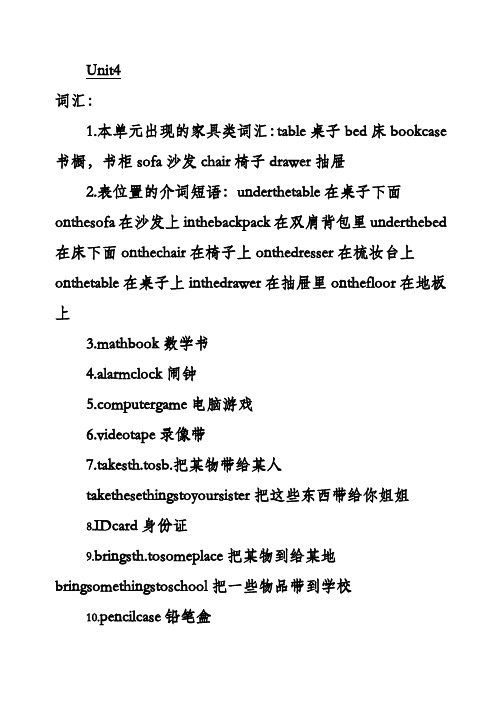
Unit4词汇:1.本单元出现的家具类词汇:table桌子bed床bookcase 书橱,书柜sofa沙发chair椅子drawer抽屉2.表位置的介词短语:underthetable在桌子下面onthesofa在沙发上inthebackpack在双肩背包里underthebed 在床下面onthechair在椅子上onthedresser在梳妆台上onthetable在桌子上inthedrawer在抽屉里onthefloor在地板上3.mathbook数学书4.alarmclock闹钟putergame电脑游戏6.videotape录像带7.takesth.tosb.把某物带给某人takethesethingstoyoursister把这些东西带给你姐姐8.IDcard身份证9.bringsth.tosomeplace把某物到给某地bringsomethingstoschool把一些物品带到学校10.pencilcase铅笔盒11.inthebedroom在卧室12.inthekitchen在厨房句式:1.询问地点——Where+be动词+sth.答语——Itis/Theyare+表位置的介词短语—Where’smybackpack?—It’sunderthetable.—Whereareyourbooks?—They’reonthechair.2.询问某物是否在某地的句型及答语—Isthebaseballonthesofa?—No,itisn’t.It’sunderthechair.—Aretheyonthebed?—No,they’renot.3.祈使句——Pleasedosth.Pleasetakethesethingstoyoursister…4.can引导的一般疑问句Canyoubringsomethingstoschool?5.倒装句——Here+be动词+主语Hereismypen.Herearesomeapples.Unit5词汇:1.球类名词小结soccerball英式足球ping-pongball乒乓球tennis网球volleyball排球basketball篮球2.“球拍”的表达tennisracket网球拍ping-pongbat乒乓球拍3.play+名词结构的短语playsports参加体育运动playcomputergames玩电脑游戏4.“play+球类名词”结构的短语playping-pongball打乒乓球playtennis打网球playsoccer踢足球playvolleyball打排球5.sportsclub运动俱乐部6.For+具体的人对。
人教版初中英语九年级4-6单元学霸笔记

Unit 4 I used to be afraid of the dark.Section A一、重点单词1. shy—shyness (n.)2. help—helpful (adj.)3. speak—speech (n. )4. Asia—Asian (adj.)5. Africa—African (adj.)6. silent—silence (n.)—silently (adv.)7. humor—humorous (adj.)8. Europe—European (adj.)9. crowd—crowded (adj.)10. deal—dealt (过去式)—dealt (过去分词)11. Britain—British (adj.)二、重点短语1. be afraid of害怕2. not enough to do sth.不足以做某事3. get good grades in…在……方面取得好成绩4. be more interested in…对……更感兴趣5. from time to time时常;有时=sometimes6. talk to /with…和……谈话=communicate with7. see sb. doing sth.看见某人在做某事8. take up doing sth.开始做某事= start to do sth.9. deal with应对;处理=do with10. dare (not) to do sth.(不)敢做某事11. not…anymore不再…… = no more12. all the time一直;总是=always13. worry about…担心…… =be worried about=be nervous about /of14. be very careful about…非常注意……15. be prepared to do sth.准备好做某事16. give up doing sth. 放弃(做)…… = stop doing sth.17. fight on继续战斗18. require a lot of talent需要很多天赋19. make it to the top能成功到达顶峰= reach the top successfully20. a very small number of一小部分21. eat a lot of vegetables吃大量的蔬菜22. listen to pop music听流行音乐23. watch scary movies看恐怖片24. in public公开地;在别人(尤指生人)面前25. at least至少三、重点句子1. 他过去个子真矮。
chapter记忆方法

chapter记忆方法摘要:一、引言1.记忆方法的必要性2.记忆方法的重要性二、常见记忆方法介绍1.关联法2.首字母法3.记忆宫殿法4.分类法5.创造性联想法三、记忆方法的实践与应用1.学习场景中的应用2.工作场景中的应用3.生活场景中的应用四、提高记忆效果的技巧1.创造有利的学习环境2.制定合理的记忆计划3.适时复习与巩固4.保持良好的作息与饮食习惯五、总结与展望1.记忆方法在个人成长中的作用2.未来记忆方法的发展趋势正文:一、引言在我们的日常生活中,记忆发挥着至关重要的作用。
从学习到工作,从社交到生活,记忆无时无刻不在影响着我们。
因此,掌握一些有效的记忆方法显得尤为重要。
本文将介绍一系列实用的记忆方法,帮助大家提高记忆效果,从而更好地应对各种挑战。
二、常见记忆方法介绍1.关联法:这是一种将需要记忆的信息与已知的知识关联起来,从而达到加深记忆的方法。
例如,在学习历史事件时,可以将事件发生的时间、地点、人物等信息进行关联,从而更容易记住这些内容。
2.首字母法:这是一种将需要记忆的单词或短语的首字母提取出来,形成一个缩写,便于记忆的方法。
例如,单词“encyclopedia”的首字母提取出来就是“e”,可以用来记忆这个词。
3.记忆宫殿法:这是一种通过空间记忆来提高记忆效果的方法。
基本思路是将要记忆的内容与熟悉的地点和物品进行关联,从而在回忆时可以通过想象这些地点和物品来还原记忆内容。
4.分类法:这是一种将需要记忆的内容进行分类整理,从而提高记忆效果的方法。
分类可以帮助我们更好地理解和消化信息,使记忆更加深刻。
5.创造性联想法:这是一种通过将抽象的概念或难以记忆的内容与生动的形象、情境等进行联想,从而提高记忆效果的方法。
例如,将枯燥的数字与生活中的实际场景进行联想,使记忆更加有趣。
三、记忆方法的实践与应用1.学习场景中的应用:在学校或自学过程中,我们可以运用关联法、首字母法、记忆宫殿法等记忆方法来提高学习效果。
剑桥预备级上册4--6单元单词句型总结
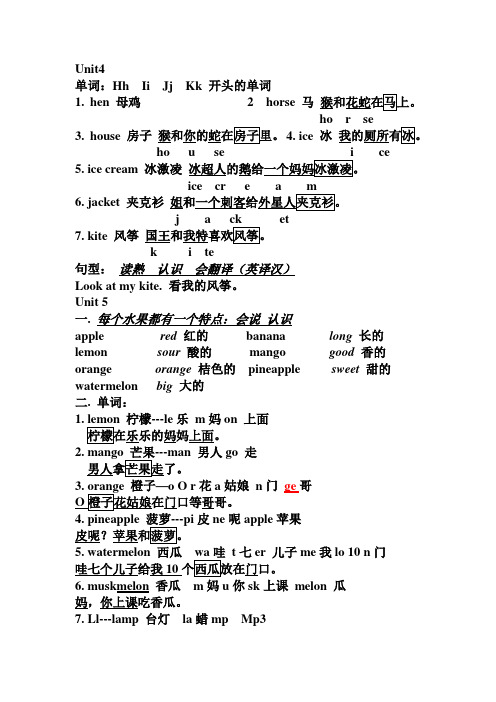
Unit4单词:Hh Ii Jj Kk 开头的单词1.hen 母鸡 2 horse 马猴和花蛇在马上。
ho r se3.house 房子猴和你的蛇在房子里。
4. ice 冰我的厕所有冰。
ho u se ce5. ice cream 冰激凌冰超人的鹅给一个妈妈冰激凌。
ice cr e6. jacket 夹克衫姐和一个刺客给外星人夹克衫。
j a et7. kite 风筝国王和我特喜欢风筝。
k i te句型:读熟认识会翻译(英译汉)Look at my kite. 看我的风筝。
Unit 5一. 每个水果都有一个特点:会说认识apple red红的banana long 长的lemon sour 酸的mango good香的orange orange 桔色的pineapple sweet甜的watermelon big大的二. 单词:柠檬---le乐m妈on 上面柠檬在乐乐的妈妈上面。
男人go 走男人拿芒果走了。
—o O r花a姑娘n门ge哥橙子花姑娘在门口等哥哥。
4. pineapple 皮ne呢apple苹果皮呢?苹果和菠萝。
5. watermelon 西瓜t七er 儿子me我lo 10 n门哇七个儿子给我10个西瓜放在门口。
6. muskmelon 香瓜m妈u你sk上课melon 瓜妈,你上课吃香瓜。
7. Ll---lamp 台灯la蜡mp Mp3蜡做的Mp38. light 电灯li 李干活t 七姓李的干活点了七个灯。
9. n---noseno没有se蛇没有鼻子的蛇。
句型:1. This is the letter L.这是字母L2. Please read after me. 请跟我读。
请读在。
后我3. Look! The letter L.看!字母L.谜语:小偷最怕的英语字母是什么?答案是:O I C U Oh, I can see you.哦,我能看见你。
Unit 6单词:qu去ee 2鹅n门鹅的门口。
- 1、下载文档前请自行甄别文档内容的完整性,平台不提供额外的编辑、内容补充、找答案等附加服务。
- 2、"仅部分预览"的文档,不可在线预览部分如存在完整性等问题,可反馈申请退款(可完整预览的文档不适用该条件!)。
- 3、如文档侵犯您的权益,请联系客服反馈,我们会尽快为您处理(人工客服工作时间:9:00-18:30)。
Chapter 4relinquish 不再采取行动,放弃(re+linqu离开+ish=再次离开,不再要=放弃)linqu=leave,表示”离开”delinquent a 有过失的,犯法的(de一再+linqu+ent=一再离开[正道]=有过失)delinquency n 失职,过失relinquish v 放弃,防开(re远+linqu+ish=远离=放弃:re表示”远”,如remote遥远的)impetuous a 冲动的(impetus+ous)pet=seek,表示”追寻,寻求”petition n 请愿,申请(pet+ition=追寻状态=请愿)petitioner n 请愿者(petition+er)appetite n 欲望,胃口(ap加强动作+pet+ite=一再追求=有胃口)centripetal a 向心的(centri中心+pet+al=追求中心的)compete v 竞争,竞赛(com共同+pete=共同追求[一个目标]=竞争)competent a 资格的,能力的(compete+ent=竞争的,有资格的)competence n 资格,能力(compete+ence=竞争的[能力]=资格)competitive a 有竞争力的(compete+itive)incompetent a 无能的(in无+competent有能力的)impetus n 动力,冲动(im内+pet+us=内在的追求=冲动)perpetuate v 使永久,不朽(per全部,永久+pet+uate=追求永久)perpetual a 永久的(per+pet+ual)petulant a (脾气)暴躁的(pet+ulant多…的=追求太多,致脾气不好)propitiate v 获宠爱,抚慰(pro前+pit[=pet]+iate=追到前面去=获宠)propitious a 幸运的,吉祥的(pro前+pit+ious=在[别人]前面追到=幸运的)单词词源词典Etymologically, impetuous means ‘having impetus’. It comes from Latin impetuōsus, a derivative of the noun impetus ‘attack’ (source of English impetus [17]), which in turn was based on impetere ‘attack’. This was a compound verb formed from the prefix in- ‘against’ and petere ‘go towards, seek, attack’ (source of English appetite, compete, perpetuate, petition, petulant, and repeat). The etym ological idea u nderlying both words is thus of ‘rushing towards something with great violence or aggression’. Another member of the same fam ily is impetigo [16], the name of a sort of skin disease. This was borrowed from Latin impetīgō, whose medical meaning was a specialization of an earlier and much more general ‘attack’ (as in ‘an attack of eczema’).maudlinadj 感情脆弱的;容易伤感的【类】mawkish :sentiment=pedantic:scholarship感情脆弱的有多愁善感=书生气的有学识maudlin:sentimental=obsequious:deferential=peeved:annoyed感情脆弱的:多愁善感的=谄媚的:尊敬的=气恼的:苦恼的【同】sentimental, bathetic, mawkish单词词源词典maudlinMaudlin represents a gradual erosion of the pronunciation of Magdalen (exhibited also in the case of the Oxford and Cambridge colleges that have taken that name). The word originated as the name given to a woman called Mary who came from Magdala on the Sea of Galilee, and who according to the Bible was present at Christ’s crucifixion and was the first to meet him after he had risen from the dead. In the Middle Ages she was generally represented in paintings as crying, and so maudlin came to be used for ‘oversentimental’. beratev. (愤怒并长时间地)批评;严厉指责=scold=rebuke=jaw=rail=rate=revile=upbraid=vituperate【反】commend/ praise 称赞【记】rate 除了比率,估价外,还有责骂的意思。
ubiquitous a 无处不在的(ubi地方+quit+ous=自由地进入任何地方)quit= free, 表示”自由”quit v 停止,放弃(放弃[追求],获得自由)quitclaim n 放弃权利(quit+claim宣告)acquit v 开释,免罪(ac给予+quit=给予自由)acquittal n 释放,还清(债)(acquit+t+al)requite v 报答,报应(re回+quite自由,释放=回到自由状态=报答了[别人]恩惠)requital n 报答,报应(requite+al)ubiquitous a 无处不在的(ubi地方+quit+ous=自由地进入任何地方)ubiquitous[19] Latin ubīque meant ‘everywhere’ (it was formed from ubī‘where’ a nd a generalizing particle -que). From it was derived the modern Latin noun ubīquitās ‘quality of being everywhere’. This was adopted into English as ubiquity [16], which later formed the basis of ubiquitous.zenith n 天顶(zeni顶点)n. 顶点, 天顶, 最高点(the highest point reached in the heavens by a celestial body)【同】apex , acme, apogee, climax, culmination, peak, pinnacle, summitzenith[14] Arabic samt arrās means literally ‘path over the head’. Samt ‘path, road’ made its way via Old Spanish zenit and Old French cenit into English as zenith, bringing with it the metaphorical application to the ‘point in the sky directly overhead’. The plural of samt, sumūt, is the ultimate source of English azimuth [14].estrangevt.使疏远;使隔离(separate; alienate)【反】reconciliation/rapprochement 和好infallible a 无可指责的(in无+fallible=无错误的)fall, fail, fault=err, deceive,表示”犯错误,欺骗”fallacy n 错误,谬论(fall+acy)fallacious a 犯错误的(fall+acious有…的=有错误的)fallible a 易错的(fail+ible能…的=能犯错误的)infallible a 无可指责的(in无+fallible=无错误的)falsehood n虚伪,错误(false错,假+hood 表示状态=假的状态)falsify v 篡改,欺骗(fals+ify表动词=弄错=篡改)falsification n 伪造,曲解(falsify+ic+ation)failing n 缺点,短处(fail+ing表动名词=错误之处=缺点)failure n 失败(fail+ure=错误状态=失败)unfailing a 不会有错的(un不+failing=不错的)fault n 过失,缺点(fault=fal错)edfault v / n. 拖久(债),违约(de犯+fault=犯错误=拖久[债])euphoric←euphoria n 欣快症(eu好+phor带来+ia)-ia(1) 表名词,”某种病”insomnia n 失眠症(in 不+somn 睡眠+ia)anemia n 贫血症(a 无+nem 血+ia)phobia n 恐惧症(2) 表名词,”总称, 状态”militia n 自卫队, 国民军(milit 军队+ia)utopia n 乌托邦(u 无+top 地方+ia, 现实中没有的地方)euphoria幸福愉快感(eu+phor带来+ia=带来美好=愉快)eu-表示”好,优秀”eulogize赞美(eu+log说+ize=说好话)euphemism委婉的词语(eu+phem讲话+ism=讲好话)euphonious声音优美的(eu+phon声音+ious=声音好听的)eurhythmic协调的(eu+rhythm节奏+ic)euphoria幸福愉快感(eu+phor带来+ia=带来美好=愉快)eugenics优生学(eu+gen产出+ics=产生优秀(后代)=优秀生)euphoria n 愉快感,欣快症(eu美好+phor+ia病=带来美好的病=欣快症)phor=bring,表示”带来”euphoria n 愉快感,欣快症(eu美好+phor+ia病=带来美好的病=欣快症)aphorism n 格言,警句(a+phor+ism=带来[思想,智慧]=格言)dysphoria n 烦躁不安(dys坏+phor+ia病=带来坏的病=烦躁不安)regressv. 复原,逆行,使倒退((re相反+gress走=反方向走=退步,倒退)gress=.go,walk,表示”行走”aggress v 侵略,攻击(ag再=gress=走了还走=攻击侵略)aggressive a 侵略的,进取的(ag+gress+ive)congress n 国会,代表大会(con共同+gress=走到一起=代表大会)digress v 离题(di偏离+gress=走偏离=离题)digression n 离题,枝节话(digress+ion)progress n 进步,进行(pro向前+gress=向前走=前进)progressive a 进步的(progress+ive)transgress n 超过,违背(trans横+gress=横着走=违背)transgression n 违法(transgress+ion)egress n 出口,出路(e 出+gress=走出=出口)ingress n 进口,入场(in进+gress=走进=进口)retrogress v 倒退,退步(retro向后+gress=倒退)Chapter 5dormant adj.睡眠状态的, 静止的, 隐匿的【根】dorm=to sleep(睡眠)dormitory 宿舍dormouse 冬眠鼠;睡鼠dormancy休眠dormer 天窗Like dormitory and dormer, dormant comes ultimately from Latin dormīre ‘sleep’, which is related to Sanskrit drā- ‘sleep’ and Russian dremat’ ‘doze’. Dormant was borrowed from French dormant, the present participle of dormir ‘sleep’, w hile dormitory [15] comes from Latin dormītōrium, a derivative of the past participle of dormīre. Dormer [16], from Old French dormeor, a derivative of dormir, originally signified a ‘dormitory window’. (It is not clear whether dormouse [15] is related, but if it is it would mean literally ‘sleeping mouse’, or conceivably even ‘sleeper’, from French dormeuse, the feminine of dormeur ‘sleeper’.)disseminate v 散布,播种(dis分开+semin+ate=把种子散开=播种)semin=seed,表示”种子”inseminate v 播种子,使怀孕(in进入+semin+ate=种子进入=使…怀孕)seminal a 繁殖的,开创性的seminary n 神学院,研究班(semin+ary表示场所=上帝的种子场=神学院)disseminate散布,传播(dis+semin种子+ate=散布(种子))dis-①表示”不,消失掉”dislike不喜欢(dis+like喜爱=不喜爱)disorder无秩序(dis+order顺序=没有顺序)dishonest不诚实的(dis+honest诚实的)disappear消失(dis+appear出现=不出现=消失)discourage使失去勇气(dis+courage勇气)disarm解除武装(dis+arm武装=去掉武装)discover发现(dis+cover盖=把盖揭开=发现)②表示”分开,分离”dispel驱除,消除(dis+pel推=推开=驱除)disseminate散布,传播(dis+semin种子+ate=散布(种子))dispense分配(dis+pense花费=分开花费=分配(财富等))distract分心(dis+tract拉=把(心)拉开=分心)distend膨胀(dis+tend拉=分开拉=膨胀)discriminate辨别,歧视(dis+crimin分辨=ate=分辩开)dismiss解散,开除(dis+miss送=送出=解散)discard丢弃,抛弃(dis+card扔=扔出去)discuss讨论(dis+cuss敲打=把(问题)分开敲=讨论)irrevocable a 不能改变的(ir不+revocable=不可废除的)voc, vok=call voice,表示”叫喊,声音”vocal a 声音的vocalist n 歌手(vocal声音的+ist人)vocation n 职业,使命(voc+ation=[受到]召唤=有职业)avocation n 副业(a不+vocation职业=不是职业,是副业)vocabulary n 词汇(vocabul[=vocable词]+ary=词汇)advocate v 拥护,倡议(ad增强+voc+ate=增强声音=拥护)advocator n 拥护者convoke v 召集(con共同+vok+e=喊到一起)convocation n 召集,集会(con+voc+ation)revoke v 取消,撤回(re回+vok+e=喊回来=取消)revocable a 可废除的(revoke+able)irrevocable a 不能改变的(ir不+revocable=不可废除的)evoke v 唤醒,唤起(e出+vok+e=喊出[思想等]=唤醒)equivoque n 双关语(equi平等+voque=有两重声音[平等]=双关语)equivocal a 双关语,模陵两可的(equi平等+voc+al=平等声音=模陵两可的)equivocate v 推脱,支吾说谎(equi+voc+ate)invoke v 请求,使[使[法规]生效(in进+vok+e喊进去=请求)invocatory a 祈求的(in+voc+atory)provoke v 触怒,煽动(pro前面+vok+e=到[别人]面前喊=激怒)provocative a 激怒人的,激发人的(pro+voe+ative)irrevocable不可取消的(来自:revoke取消)il-,ir-①放在同辅音词根前表示”不,无”illegal非法的(il+legal合法的)illiterate 不识字的(il+literate认字的)irregular不规则的(ir+regular规则的)irrational不合理的(ir+rational合理的)irrelative无关的(ir+relative相关的)irresolute无决断力的(ir+resolute果断的)irresistible不可抗拒的(ir+resistible可抗拒的)irrevocable不可取消的(ir+revocable可取消的,来自:revoke取消)②表示”使….成为,进入”illustrate说明,阐明(il+lustr光+ate=进入光明=说明)illuminate照亮,使明白(il+lumin光+ate=进入光明=说明)illusion幻觉(il+lus玩弄+ion=被(幻觉)玩弄=幻觉)irruption闯入,冲入(ir+rupt断+ion=打断(别人)=闯入)irradiate使明亮,生辉(ir+radi发光+ate=发光=生辉)irritate激怒,刺激(ir+rit擦+ate=进入磨擦=激怒)proliferate 繁殖,增殖(pro+lifer带来+ate=带来很多生命=繁殖)pro-①表示”向前,在前”progress 进步(pro+gress走=向前走)project 投射出;工程项目(pro+ject+扔+扔向前面=投射;引申为工程项目) prologue 前言,序言(pro+logue说=在前面说=前言)promote 促进;提升(pro+mote动=向前动=促进)protrude 向前突出(pro+trude突出=向前突出)propel 推进(pro+pel推=向前推)proficient 精通的;熟练的(pro+fici做+ent=做在[别人] 前面=精通)profile 侧面像;轮廓(pro+file纱线=前面的线条)profess 公开表明,坦白(pro+fess说=在前面说坦白)prodigious (数量等)巨大的(pro=pro+ig=act做=做在前面,做得多=大量的) proclivity 倾向性,癖性(pro+cliv倾斜+ity=向前倾斜)procure (费心)取得,获得(pro+cure关心=关心在前=[想要]获得) prominent 显著的,杰出的(pro+min伸+ent=向前伸出=杰出的) prosecute 检举;指控(pro+secu追随+ate=追随到[法院]前面=检举;指控) prospect 景象,前景(pro+spect看=向前看=前景)provident 顾及未来的,有远见的(pro+vid看+ent=向前看的=有远见的) provoke 激怒,刺激(pro+voke喊=在[你]前面喊=激怒[你])②表示”很多…”procrastinate 拖延(pro+crastin明天+ate=有许多明天明日复明日=拖延) procreate 生育(pro+create创造=创造很多=生儿育女)profligate 浪费的,挥霍的(pro+flig打出+ate=把钱不断的打出去=挥霍) proliferate 繁殖,增殖(pro+lifer带来+ate=带来很多生命=繁殖)profit 利润,收益(pro+fit做=做很多=做得好=利润)profuse 大量的,丰富的(pro+fuse流=流很多=大量的)prolific 多产的,多育的(pro+lif带来+ic=带来东西=多产的)prosperous 兴旺的,繁荣的(pro+sper希望+ous=希望很多=兴旺的)③表示”赞同,亲…”pro-american 亲美的proslavery 赞成奴隶制的(pro+slavery奴隶制)proabortionist 赞成堕胎者的(pro+abortion堕胎+ist)corroborate证实(cor+robor力量+ate=用力量=证实)col-,cor在同辅音词根前,表示”共同”collaboration协作,合著(col+labor劳动+ation=共同劳动)collocate并置,排列(col+loc地方+ate=放在同一地方=排列)collapse倒塌(col+lapse滑倒=全部滑倒=倒塌)collate校对(col+late放=放到一起=校对)collateral并列的,并行的(col+later边=al=周边的=并列的)colleague同事(col+=league捆绑=捆绑在一起的人=同事)collect收集(col+lect选择=放在一起选择=收集)collegiate学院的, 学生的(col+legi读+ate=共同读书=学院的)colloquial口语的(col+loqu说+ial=两人一起说=口语会话的)collusion共谋,勾结(col+lus玩+ion=共同玩弄=共谋)correct改正,纠正(cor+rect正=全部改正=纠正)correspond通信,符合(cor+respond反应=共同反应=相互通信)corrupt腐败的,变环的(cor+rupt断=全部断=变坏的,腐败的)corrigible能够改正的(cor+rig改正+ible=全部改正的)corroborate v 证实,加强(cor共同+robor+ate=共同有力量=加强,证实) robor=strength,表示”力量”roborant a 增强体力的(robor+ant)robust a 强壮的(rob[=robor]+ust表形容词)hoistv.举起,升起,吊起The newly imprisoned prisoners poisoned poisonous moisture are hoisted out from the prison.中了有毒湿气毒的新近关押的囚犯被从监狱吊出.hoist[16] The history of hoist cannot be traced back very far. It is an alteration of a now defunct hoise (probably due to the mistaking of the past form hoised for a present form), which itself was an alteration of an earlier heise. This probably came from, or at least was related to, Dutch hijsen or Low German hissen ‘raise’. Heist ‘robbery, hold-up’ [20], whi ch originated in the USA, is a variant of hoist, and perhaps represents a survival of heise.Link: HEISTprecipitateprecipitate加速,促进,cap, cipit=head,表示”头”capital首要的,首都,资本(capit+al=头的=首要的=首都)captain首领,船长cape海角,岬capitulate(有条件)投降(capit+ulate表示动词=头低下=投降)precipice悬崖(pre前+cipice头=前面是尽头=悬崖)charlatann 江湖郎中;骗子(对自己的技术或知识夸大其辞的人)=fake=mountebank=quack【源】原指:大吹大擂推销商品的人。
